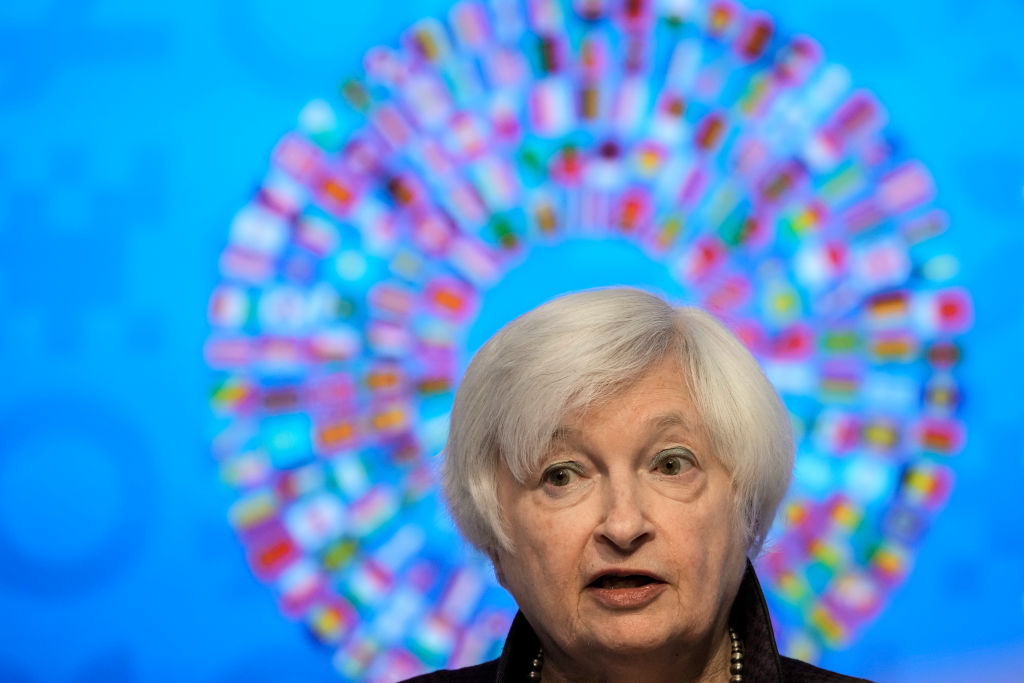It always makes me smile a little—and wince a little—when the World Socialist Web Site, the official online publication of the International Committee of the Fourth International, feels compelled to write about the market for U.S. Treasury bonds. It’s even more alarming when the rotten old reds have the story more or less right.
To mark the occasion, here’s a little bonus “Economics for English Majors.”
The U.S. government funds its operations—and creates its debt—by selling a variety of bonds to investors around the world. Some of those investors are individuals, but the most important of them are large institutions: foreign central banks, insurance companies and other financial institutions, pension funds, etc. Because U.S. government debt is considered very safe—meaning that the investors judge the possibility that Washington will fail to make good on its debts to be very low—investors don’t get paid very high interest rates to lend the U.S. government money, which is what buying a bond amounts to. But even though returns typically are low, Treasury bonds are attractive to investors for many reasons beyond yield: The returns may be low but they are predictable, it is usually easy to sell your bonds if you decide you need to raise some cash, investors in countries with less stable currencies like having some of their money in dollar-denominated assets, etc.
So attractive are those qualities that some investors will even willingly lose money on them, accepting “negative yields,” at least for a time, paying for the privilege of putting their money into something as safe and stable as U.S. Treasuries or high-quality European government debt during times of uncertainty and volatility. But there are limits to that. While we sometimes talk about the Federal Reserve or the U.S. government as though they have godlike powers to dictate what interest rates are, it is markets, not policymakers, that really set interest rates: You can offer a bond for sale at 5 percent, but the market decides whether that’s a good price or not. If the markets aren’t buying your economic story, you’ll find out in a hurry—ask Liz Truss.
Bond investors have been getting the tar kicked out of them by high inflation. If the rate of inflation exceeds the interest rate on your bond, your real yield is negative—you are losing money. Again, investors will accept that at times—for a time, and up to a point. And then they won’t.
The U.S. government has been trying to deal with inflation in part by reducing the amount of ready cash that’s sloshing around the economy. Whereas the Fed had been involved in Covid-era “quantitative easing”—meaning buying up government debt to inject cash into the economy—it is now engaged in quantitative tightening, selling off some of its portfolio as a way of hoovering up ready cash so that people will have less of it to spend, and in that way putting downward pressure on prices. It is doing so while Washington continues to spend money madly—meaning that there is a lot of debt coming onto the market—even while demand for that debt by many big, important buyers such as overseas pension funds and life insurers is stagnant or declining. Even though interest rates have been going up, there seems to be less appetite among investors for Treasury bonds. Right now, those bonds are not as easy to sell as they normally are (that is what is meant by “reduced liquidity”), either for traders or for the Treasury itself, which is having to pay more to borrow. That could cause real trouble—potentially, trouble of the sort that would be far worse than the financial crisis of 2007-08.
There is one fundamental reason for this: The U.S. government has added $7 trillion in new debt since 2019, and the big debt investors don’t want to take it all—the supply of new debt is exceeding demand, or at least close to exceeding demand. We’ll know if it actually exceeds demand if there is a “failed auction” of Treasury bonds, meaning that Washington puts $x billion up for sale and then doesn’t quite manage to sell them—meaning that the U.S. government has gone to the market to borrow money and the market has said, “No.” What does that look like? Imagine taking the philosophy of “too big to fail” and then applying it to the U.S. government as the Treasury tries to bail out itself—which is, in a weird way, already something being contemplated by the Biden administration. What the Treasury is considering is issuing new bonds to buy back old debt, something the government has done before—but typically during times of budget surplus, as a way of keeping a hand in the debt market when it wasn’t taking on new debt. Using debt financing to buy back old debt as a way to prime the market for new debt is something novel to say the least—it is, in effect, trying to borrow your way to a better credit.
Here, the economics and the politics are at odds, and the politics is winning, of course. The smart thing to do would be to sharply cut government spending: We have too much inflation and too much government debt, and cutting spending would relieve pressure on both of those. Instead, the Biden administration and its congressional allies want to keep spending high—and ramp it up even higher—while trying to use back-end financial shenanigans to deal with the consequences.
Republicans used to talk a pretty good game about getting spending under control, and they even took the occasional baby step in the right direction. They seem to have made their peace with big-spending politics and growing deficits in the Trump years, and right now are at the nadir of their credibility on the fiscal issue—just when action is needed. If Republicans do indeed win control of Congress in the upcoming election, then it will fall to them to do the most difficult and unpopular thing: impose a bit of real fiscal restraint on Washington. I have my doubts that they are politically up to the task.
The socialists no doubt are out there quietly cheering for another financial crisis—one more nail in the coffin of capitalism, from their point of view. It is not entirely comforting to think that Republicans may soon be in a position to entrust the job of preventing an economic catastrophe to Marjorie Taylor Greene and Mehmet Oz. Hooray for populism.





Please note that we at The Dispatch hold ourselves, our work, and our commenters to a higher standard than other places on the internet. We welcome comments that foster genuine debate or discussion—including comments critical of us or our work—but responses that include ad hominem attacks on fellow Dispatch members or are intended to stoke fear and anger may be moderated.
With your membership, you only have the ability to comment on The Morning Dispatch articles. Consider upgrading to join the conversation everywhere.